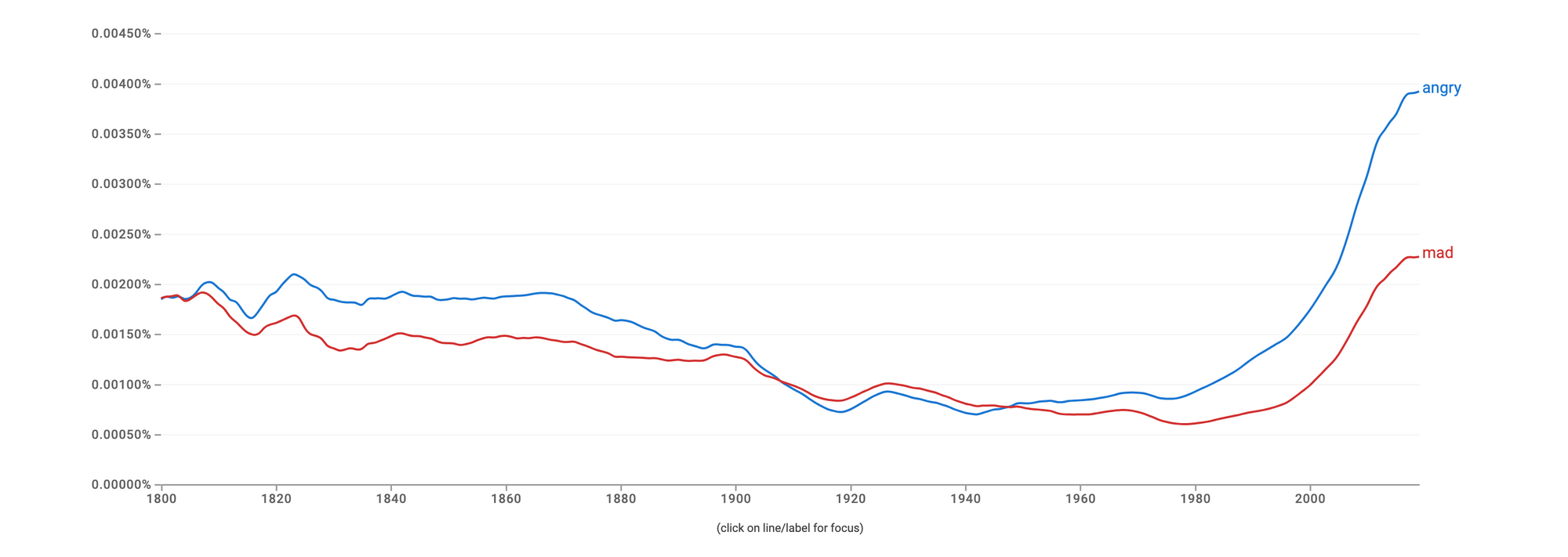- Mad and angry are both emotions indicating displeasure or irritation. "Mad" typically implies a more intense or irrational feeling of annoyance, while "angry" suggests a strong feeling of displeasure or hostility towards someone or something.
😠 The customer became angry when the restaurant served the wrong order for the third time in a row.
What is the difference between "mad" and "angry?"
"Mad" and "angry" are often used interchangeably, but they can carry slightly different connotations depending on context and region.
"Mad" typically implies a sense of being mentally disturbed or irrational, often used to describe intense or extreme emotional states. It can suggest a feeling of frustration, irritation, or annoyance. In some contexts, especially in American English, "mad" can also mean "crazy" or "insane."
On the other hand, "angry" specifically refers to a feeling of displeasure, hostility, or resentment towards someone or something. It tends to convey a more focused and directed emotion, often arising from a perceived wrongdoing or injustice.
When to use "mad"
"Mad" is typically used to describe a range of intense or extreme emotions, such as anger, frustration, irritation, or even excitement. It can also be used colloquially to mean "crazy" or "insane." Here are some situations where "mad" might be appropriate:
- When expressing strong feelings of anger or frustration: "I got mad when my flight was delayed for the third time."
- When describing intense emotional states: "She was mad with grief after losing her pet."
- When indicating excitement or enthusiasm: "The kids were mad about the new video game."
However, it's essential to note that the usage of "mad" can vary depending on context, region, and individual interpretation. In some cases, it may be considered informal or colloquial, so it's essential to use it appropriately based on the tone and audience of your communication.
Examples from the web
"Has the world gone mad?" - The Guardian - Opinion
"Because the idea of being on your feet for two hours a day is mad." - The Guardian - Opinion
When to use "angry"
"Angry" is used to describe a specific emotion of displeasure, resentment, or hostility towards someone or something. Here are some situations where "angry" might be appropriate:
- When expressing irritation or resentment towards a person or situation: "She was angry with her colleague for taking credit for her work."
- When describing a feeling of frustration or indignation: "He became angry when he realized he had been lied to."
- When indicating a strong emotional response to an injustice or wrongdoing: "The protesters were angry about the government's decision to raise taxes."
- When discussing the physical and emotional manifestations of anger: "His face turned red, and his voice grew louder as he became increasingly angry."
"Angry" is a more focused term than "mad" and specifically refers to feelings of displeasure or resentment directed towards a particular target or situation. It's essential to use "angry" appropriately to convey the intensity and specificity of this emotion in various contexts.
Examples from the web
"Others were terrified, frightened, confused, angry, intimidated and tearful." - The Guardian
"I was angry because I knew that I was too young to confront the nihilistic truth that Christmas was suddenly devoid of meaning or purpose." - The Guardian - Opinion
The use of "mad" and "angry" over time
Examining the graph below, we can see that "angry" is used more often than"mad." It is interesting to note that their usage follows the same trajectory.

Synonyms
Mad
- Furious
- Irritated
- Enraged
- Wrathful
- Indignant
- Incensed
- Livid
- Infuriated
- Raging
- Annoyed
Angry
- Angry
- Furious
- Irritated
- Upset
- Enraged
- Incensed
- Livid
- Wrathful
- Fuming
- Infuriated

FAQs
What does mad with anger mean?
"Mad with anger" means experiencing intense and uncontrollable feelings of fury or rage. It implies a state of extreme emotional agitation and may manifest physically or verbally in expressions of hostility or aggression towards others.
Is it mad at me or angry with me?
Both "mad at me" and "angry with me" convey negative feelings, but "mad at me" typically implies a temporary state of annoyance, while "angry with me" suggests a deeper sense of resentment or displeasure, often resulting from a perceived wrongdoing or injustice.
Summary
This blog post delves into the nuances between "mad" and "angry," two commonly used terms to describe negative emotions. It explores how "mad" often signifies intense or irrational feelings, while "angry" specifically denotes resentment or displeasure towards someone or something. Through examples and analysis, readers gain insights into the subtle distinctions and learn to use these terms accurately in various contexts.

Want to sound like a native speaker?
Engram’s AI-powered grammar checker makes your English sound like a native speaker’s, suggesting natural English expressions on top of fixing grammar, spelling, punctuation, word order, and vocabulary.

References















